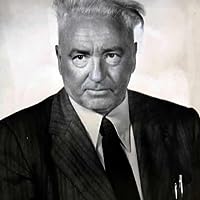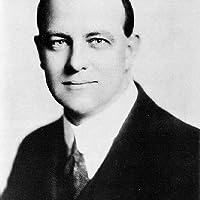1940 Quotes
Quotes tagged as "1940"
Showing 1-9 of 9

“Do you ever find yourself climbing into an open grave during a bombing raid..and wish you'd just stayed in bed?”
― Hollow City
― Hollow City

“This is no war of chieftains or of princes, of dynasties or national ambition; it is a war of peoples and of causes. There are vast numbers, not only in this Island but in every land, who will render faithful service in this war, but whose names will never be known, whose deeds will never be recorded. This is a War of the Unknown Warriors”
―
―

“You frequently state, and in your letter you imply, that I have developed a completely one-sided outlook and look at everything in terms of science. Obviously my method of thought and reasoning is influenced by a scientific training – if that were not so my scientific training will have been a waste and a failure. But you look at science (or at least talk of it) as some sort of demoralizing invention of man, something apart from real life, and which must be cautiously guarded and kept separate from everyday existence. But science and everyday life cannot and should not be separated. Science, for me, gives a partial explanation of life. In so far as it goes, it is based on fact, experience and experiment. Your theories are those which you and many other people find easiest and pleasantest to believe, but so far as I can see, they have no foundation other than they leaf to a pleasanter view of life (and an exaggerated idea of our own importance)...
I agree that faith is essential to success in life (success of any sort) but I do not accept your definition of faith, i.e. belief in life after death. In my view, all that is necessary for faith is the belief that by doing our best we shall come nearer to success and that success in our aims (the improvement of the lot of mankind, present and future) is worth attaining. Anyone able to believe in all that religion implies obviously must have such faith, but I maintain that faith in this world is perfectly possible without faith in another world…
It has just occurred to me that you may raise the question of the creator. A creator of what? ... I see no reason to believe that a creator of protoplasm or primeval matter, if such there be, has any reason to be interested in our significant race in a tiny corner of the universe, and still less in us, as still more significant individuals. Again, I see no reason why the belief that we are insignificant or fortuitous should lessen our faith – as I have defined it.”
―
I agree that faith is essential to success in life (success of any sort) but I do not accept your definition of faith, i.e. belief in life after death. In my view, all that is necessary for faith is the belief that by doing our best we shall come nearer to success and that success in our aims (the improvement of the lot of mankind, present and future) is worth attaining. Anyone able to believe in all that religion implies obviously must have such faith, but I maintain that faith in this world is perfectly possible without faith in another world…
It has just occurred to me that you may raise the question of the creator. A creator of what? ... I see no reason to believe that a creator of protoplasm or primeval matter, if such there be, has any reason to be interested in our significant race in a tiny corner of the universe, and still less in us, as still more significant individuals. Again, I see no reason why the belief that we are insignificant or fortuitous should lessen our faith – as I have defined it.”
―

“We shall not flag nor fail. We shall go on to the end. We shall fight in France and on the seas and oceans; we shall fight with growing confidence and growing strength in the air. We shall defend our island whatever the cost may be; we shall fight on beaches, landing grounds, in fields, in streets and on the hills. We shall never surrender and even if, which I do not for the moment believe, this island or a large part of it were subjugated and starving, then our empire beyond the seas, armed and guarded by the British Fleet, will carry on the struggle until in God's good time the New World with all its power and might, sets forth to the liberation and rescue of the Old.”
―
―
“In time of war, under the banner of an enemy recognisable as such, a foreigner from a camp outside the lines, the imperial idea grew strong in confidence and temper. The British democracy rallied to the call of a strong leadership, and it was not just in rhetorical enthusiasm but with considerable personal satisfaction that Churchill hailed the year 1940-1 as the British people's 'finest hour'. He, with other imperialists, was delighted by the fact that, when it came to the sticking-place, it was the old-fashioned loyalty of the reactionary British Empire to all that was symbolised by allegiance to Crown and country that came forward to save European civilisation from utter overthrow by German tyranny...The days of showing the flag—even for only a momentary glimpse, such as wall that inhabitants of Greece and Crete and Dieppe had of it—had returned. The Empire was the Empire once more, and to 10, Downing Street returned that imperial control that two generations of Dominion opinion had combined to condemn as sinister.”
― The Imperial Idea and its Enemies: A Study on British Power
― The Imperial Idea and its Enemies: A Study on British Power

“Language, Sweet," said Magnus's mother, arriving with a plate full of homemade biscuits. She didn't scold him too harshly about his talk these days. Magnus suspected this was because Mama shared Uncle Sweet's opinion about the Nazis. Yet despite the shortages and rationing, she had managed to turn out the most delicious biscuits Magnus had ever tasted. They were redolent of butter, which Mrs. Gundersen up the hill traded for apples from the family orchard.
Uncle Sweet made a great show of fanning himself and swooning as he ate a biscuit. "Language," he said, "is nothing but a bunch of words, and there are no words to express how wonderful this cookie is. I swear, if you were not already married, I would have you locked in a workroom like Rumpelstiltskin's daughter, forced to bake for me all day." He stole another biscuit from the platter and headed for the basement, lighting his way with an oil lamp. No one ever asked where his photographic chemicals came from- no one wanted to hold the answer like a piece of stolen fruit.”
― The Apple Orchard
Uncle Sweet made a great show of fanning himself and swooning as he ate a biscuit. "Language," he said, "is nothing but a bunch of words, and there are no words to express how wonderful this cookie is. I swear, if you were not already married, I would have you locked in a workroom like Rumpelstiltskin's daughter, forced to bake for me all day." He stole another biscuit from the platter and headed for the basement, lighting his way with an oil lamp. No one ever asked where his photographic chemicals came from- no one wanted to hold the answer like a piece of stolen fruit.”
― The Apple Orchard

“The German and Russian state apparatuses grew out of despotism. For this reason the subservient nature of the human character of masses of people in Germany and in Russia was exceptionally pronounced. Thus, in both cases, the revolution led to a new despotism with the certainty of irrational logic. In contrast to the German and Russia state apparatuses, the American state apparatus was formed by groups of people who had evaded European and Asian despotism by fleeing to a virgin territory free of immediate and effective traditions. Only in this way can it be understood that, until the time of this writing, a totalitarian state apparatus was not able to develop in America, whereas in Europe every overthrow of the government carried out under the slogan of freedom inevitably led to despotism. This holds true for Robespierre, as well as for Hitler, Mussolini, and Stalin. If we want to appraise the facts impartially, then we have to point out, whether we want to or not, and whether we like it or not, that Europe's dictators, who based their power on vast millions of people, always stemmed from the suppressed classes. I do not hesitate to assert that this fact, as tragic as it is, harbors more material for social research than the facts related to the despotism of a czar or of a Kaiser Wilhelm. By comparison, the latter facts are easily understood. The founders of the American Revolution had to build their democracy from scratch on foreign soil. The men who accomplished this task had all been rebels against English despotism. The Russian Revolutionaries, on the other had, were forced to take over an already existing and very rigid government apparatus. Whereas the Americans were able to start from scratch, the Russians, as much as they fought against it, had to drag along the old. This may also account for the fact that the Americans, the memory of their own flight from despotism still fresh in their minds, assumed an entirely different—more open and more accessible—attitude toward the new refugees of 1940, than Soviet Russia, which closed its doors to them. This may explain why the attempt to preserve the old democratic ideal and the effort to develop genuine self-administration was much more forceful in the United States than anywhere else. We do not overlook the many failures and retardations caused by tradition, but in any event a revival of genuine democratic efforts took place in America and not in Russia. It can only be hoped that American democracy will thoroughly realize, and this before it is too late, that fascism is not confined to any one nation or any one party; and it is to be hoped that it will succeed in overcoming the tendency toward dictatorial forms in the people themselves. Only time will tell whether the Americans will be able to resist the compulsion of irrationality or whether they will succumb to it.”
― The Mass Psychology of Fascism
― The Mass Psychology of Fascism

“Someone might ask, if the dynamic of innovation consists of schema and revision, where does true originality come from? Is there no single work we can point to as the ultimate source of this or that new storrytelling strategy? I'm inclined to say there is no such source. Artists working in mass art forms find originality by revising schemas in circulation, or by revising ones that have fallen into disuse.”
― Reinventing Hollywood: How 1940s Filmmakers Changed Movie Storytelling
― Reinventing Hollywood: How 1940s Filmmakers Changed Movie Storytelling
All Quotes
|
My Quotes
|
Add A Quote
Browse By Tag
- Love Quotes 97k
- Life Quotes 75.5k
- Inspirational Quotes 72.5k
- Humor Quotes 43.5k
- Philosophy Quotes 29.5k
- Inspirational Quotes Quotes 27k
- God Quotes 26k
- Truth Quotes 23.5k
- Wisdom Quotes 23.5k
- Romance Quotes 23k
- Poetry Quotes 22k
- Death Quotes 20k
- Happiness Quotes 18.5k
- Life Lessons Quotes 18.5k
- Hope Quotes 18k
- Faith Quotes 18k
- Quotes Quotes 16.5k
- Inspiration Quotes 16.5k
- Spirituality Quotes 15k
- Religion Quotes 15k
- Motivational Quotes 15k
- Writing Quotes 14.5k
- Relationships Quotes 14.5k
- Life Quotes Quotes 14k
- Love Quotes Quotes 13.5k
- Success Quotes 13.5k
- Time Quotes 12.5k
- Motivation Quotes 12k
- Science Quotes 11.5k
- Knowledge Quotes 11k


